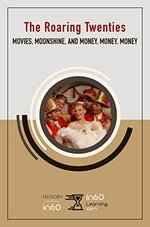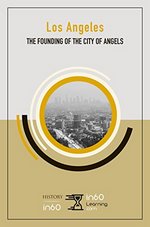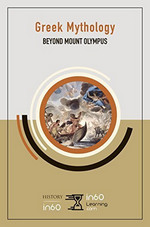by in60learning
Series: in60Learning</brKindle Edition, 38 pg.
in60Learning, 2018
Read: March 10, 2018

“It’s not by chance what Americans say when in need of a specialized or precise term, that ‘the Greeks have the word for it’.” -Aikaterini Spanakaki-Kapetanopoulos
Let me start by saying that I still think that the in60Learning project is a great idea and I hope it puts out a lot of material. I just hope that in their rush for quantity, they don’t skimp on quality. From the typographical errors to the way this was written, I think that’s a real danger.
Still, let’s focus on this volume — they really did go beyond Mount Olympus in their coverage of Greek Mythology, let’s look at the contents of this book:
An Overview of Greek Mythology
The Creation
The Gods of Mount Olympus
Other Gods, Spirits and the Stars
The Underworld and Other Beings in Greek Mythology
The Human Race and the Gods
Greek Mythology in Today’s World
That’s a lot for anyone to tackle in a book much longer than this — it’s a Herculean effort to get that much into a book this small (pun fully intended). But they go for more than an overview of Greek Mythology, they try to suggest some deeper meanings, to tie their topic into philosophical discussions and the like. Some of that worked, some of that seemed like a stretch — and some fell flat (that last paragraph, in particular, was a complete mess). You’ve got to admire the effort, though.
Not only did they cover a wide range of topics, but they worked in a lot of detail — maybe too much in some instances (including the Roman equivalent names at some points felt like they were striving for word count rather than being thorough).
One of the main theses of the book is the impact that Greek Myth had on Western Culture/the English Language, as is seen in the quotation I borrowed above and they utilized to drive home the point. Not only did they prove this point (in case anyone thought it worthy of debating), but they overdid it. At a certain point, the sections along these lines just became lists:
From the Greek god of sleep, Hypnos, is derived the word hypnosis.
From the Greek legend of the King Tantalus, is derived the word tantalize. He was condemned for eternity to stand up to his chin in the middle of a river with a fruit tree above him. Whenever he tried to drink the water, it receded from him, or grab a fruit, it pulled away from him.
From the Greek god of love, Eros, is derived the word erotic.
From the Greek goddess of love, Aphrodite, is derived the word aphrodisiac. . . .
From the god of fire and blacksmithing, Vulcan (Greek: Hephaestus), is derived the words volcano and vulcanizing.
From the Roman goddess of grain and farming, Ceres (Greek: Demeter), is derived the word cereal.
That goes on for pages (depending how you have your text size set). The facts are good, they’re on point, but it’s not good reading.
The basic overview of the Olympian myths, the origin of the universe, the war with the Titans, etc. was pretty solid. Nothing remarkable, but decently executed. The writing as a whole, however, didn’t impress me — frequently, but particularly as the authors tried to wrap up each chapter, the writing felt like it was lifted from High School term papers. I don’t necessarily think that’s a bad thing, but I got the impression that this series was supposed to be better than that.
This one didn’t work for me, but I bet there are people out there who will be helped by it. These people didn’t check out D’Aulaires’ Book of Greek Myths so many times from 3rd to 6th grade that the library might as well have given me a copy (not counting the other books on the subject I read, reread, bought, etc. at that age) or haven’t had kids during the Riordan-era of publishing. Basically, I should’ve skipped this one, I think. This slim volume took some big swings — amount of material, range of material, a couple of the “Big Ideas” running through the book, and whiffed on them all (to stick with the metaphor, I do think it caught a piece of a couple of the pitches). A strong effort, but not one that worked for me.
—–

 Benedict Arnold: From American Hero to British Traitor
Benedict Arnold: From American Hero to British Traitor








